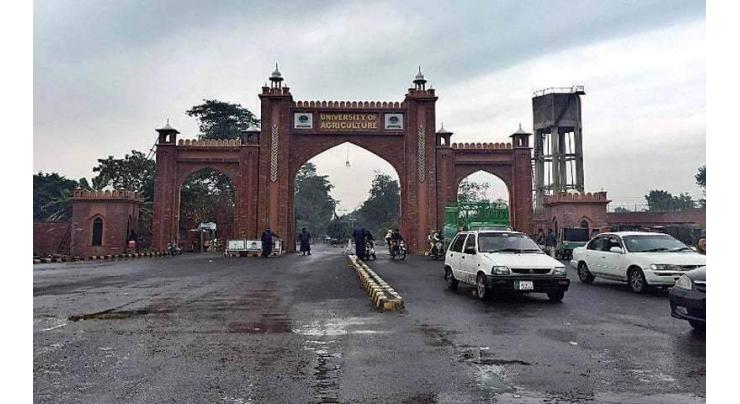
- Home
- Pakistan
- News
- DG AARI urges stakeholders to devise strategy to combat challenges of climate change
DG AARI Urges Stakeholders To Devise Strategy To Combat Challenges Of Climate Change
Mohammad Ali (@ChaudhryMAli88) Published January 10, 2023 | 08:10 PM

Director General Ayub Agricultural Research Institute (AARI) Dr. Muhammad Nawaz Khan urged all stakeholders to devise a comprehensive strategy to combat the challenges posed by climate change
FAISALABAD, (UrduPoint / Pakistan Point News - 10th Jan, 2023 ) :Director General Ayub Agricultural Research Institute (AARI) Dr. Muhammad Nawaz Khan urged all stakeholders to devise a comprehensive strategy to combat the challenges posed by climate change.
He was addressing an International Workshop organized by Precision Agriculture and Analytics Lab, National Centre in Big Data and Cloud Computing, University of Agriculture, Faisalabad (UAF) at Center for Advanced Studies auditorium.
He said that the climate change was playing havoc with the agriculture sector. He urged all stakeholders to devise a comprehensive plan to fight the challenges at the national level. He further said that adoption of modern trends was imperative to make agriculture sector compatible with global standards and ensure food security. Prof. Dr. Asif Kamran from UAF said that the country was placed in the red zone in terms of per capita water availability. He added that at the inception of the country, the per capita water availability was 5600 cubic meter whereas it had reduced to around 900 cubic meter now. He added, "We have to create awareness and take measures to promote rational usage of water and make each drop more productive through precision irrigation technologies. We need to adopt precision agriculture as every grain of seed, every millimeter of agro-chemicals, every horsepower of machinery, and every man-hour of farm labor counts to remain competitive and sustainable in face of global economic and climatic changes.
" He called for remote sensing in agriculture to estimate the crop yield that would help take timely trade related decisions.
Dr Azeem Khan, Lead Remote Sensing Scientist at the Department of Planning and Environment, Government of New South Wales, Australia said that Pakistan was a water stress country, it had low crop yields and water productivity, untapped land and water resources and a growing population. He said that the transparent information on water availability and use in the country through satellite remote sensing would be useful for not only water management purposes but also for identification of system improvements needs and investment decisions. "The confluence of big data, remote sensing, connectivity, and artificial intelligence can help us manage our water resources and increase crop water productivity substantially," he added.
Dr Khalid Hussain said Pakistan had become one of the worst victims of the climate changes as it was the real challenge to address the issue. He said that the modules of the hands-on training workshop were designed to train young faculty and Post graduate students for the latest techniques in Crop Estimation and Water Accounting.
Related Topics
Recent Stories

Delegation of international investors meets Finance Minister

Federal Govt stands with Balochistan for its development: Naqvi

UAE President receives condolences of Prime Minister of Pakistan over passing of ..

ECC approves to enhance wheat procurement targets

UN urges Israel to 'stop escalation' as tanks enter Gaza's Rafah city

EU stumps up $125 mn for Yemen after aid groups' plea

Governor Tessori condemns May 9 riots, calls it a 'pre-planned conspiracy'

PM condoles with UAE President over Sheikh Tahnoun’s death

Milan nets Giro 4th stage, Pogacar retains lead

UBS back in profit after Credit Suisse takeover losses

Asiya Gul lauds Shafaat's services as DG LG

President for dialogue with all political forces in Balochistan
More Stories From Pakistan
-
Mohsin Naqvi pays surprise visit to NADRA center
47 minutes ago -
May 9 vandalism against state of Pakistan: Muqam
2 hours ago -

Federal Govt stands with Balochistan for its development: Naqvi
2 hours ago -

Governor Tessori condemns May 9 riots, calls it a 'pre-planned conspiracy'
2 hours ago -

PM condoles with UAE President over Sheikh Tahnoun’s death
2 hours ago -

Asiya Gul lauds Shafaat's services as DG LG
2 hours ago
-

President for dialogue with all political forces in Balochistan
4 hours ago -

Supreme Court adjourns IHC judges letter case
4 hours ago -

RDMC, Hunar Foundation Vocational Training Center inaugurated in Nokkundi
4 hours ago -

Man critically injured as vehicle catches fire amid CNG filling
4 hours ago -

Provincial health ministers chair meeting of Punjab Blood Transfusion Authority
4 hours ago -

Sheikh Jafar Khan Mandukhel assumes charge as Governor Balochistan
4 hours ago









